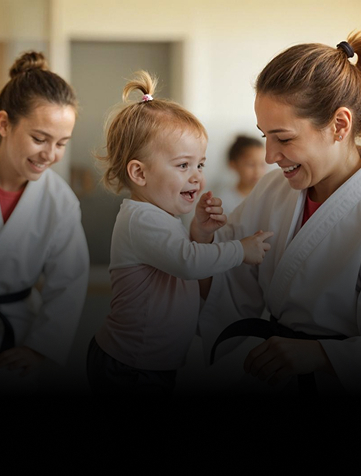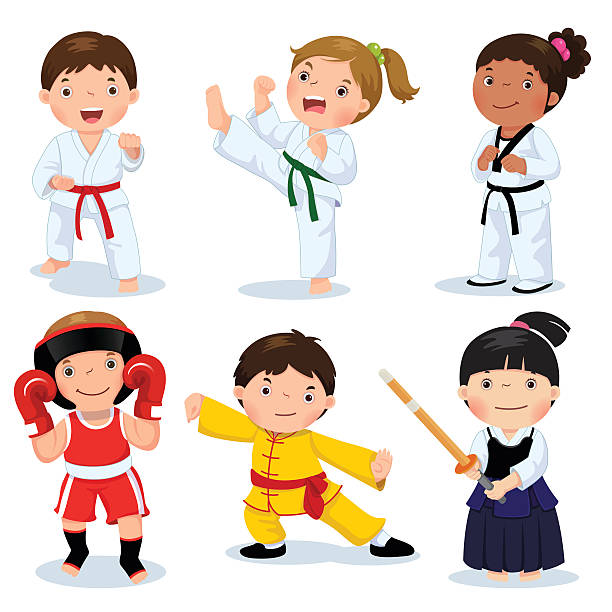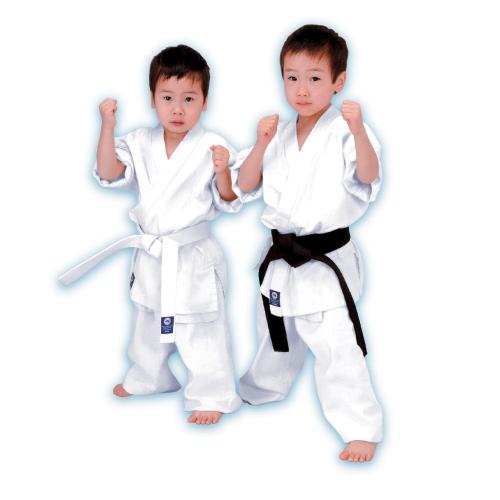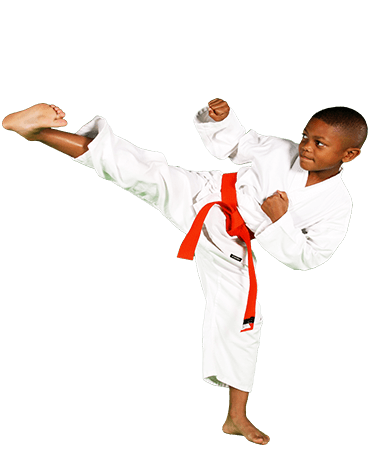Just How Karate for Kids Can Increase Self-confidence and Self-control in Youthful Martial Artists
Karate for children uses a special chance to develop self-confidence and discipline in young martial artists. As they learn brand-new techniques and face challenges, they not just obtain skills yet also develop a solid feeling of self-regard. This structured setting motivates them to respect the journey of renovation. Yet how does this training translate into their day-to-day lives? Discover the deeper links that make karate more than just a sport.
The Importance of Confidence in Childhood Growth
Confidence is an essential building block in childhood years advancement. When you support your youngster's self-esteem, you empower them to face obstacles, take threats, and reveal themselves openly. Kids with confidence are much more ready to check out brand-new tasks and social scenarios, which can bring about lasting relationships and valuable experiences.Encouraging your child to get out of their convenience zone cultivates strength. They discover that failing isn't the end however rather a tipping stone to success. By celebrating their success, regardless of how small, you aid them recognize their capabilities and worth.In this journey, assistance and favorable support from you play an essential function. Whether it's through praise or just existing, your involvement boosts their confidence. As they expand, this confidence comes to be a lifelong possession, outfitting them to navigate both obstacles and opportunities with a strong feeling of self.
Exactly How Karate Educates Self-control and Emphasis
Karate aids you develop discipline and focus through its organized training routine. As you exercise mindfulness throughout each session, you'll discover to concentrate better both on and off the floor covering. And also, setting and accomplishing objectives in martial arts enhances your ability to stay dedicated and attentive.
Structured Training Regimen
While you take part in karate training, you'll quickly find just how an organized program instills technique and emphasis in young specialists. Each course adheres to a details style, including workouts, strategy method, and sparring. This consistency shows you to appreciate the procedure and commit to enhancement. As you learn types and techniques, you create a sense of responsibility for your very own progress.The organized atmosphere motivates you to establish goals, whether grasping a new belt or refining a kata. You'll find that remaining focused during drills and courses develops your concentration. The technique you cultivate in karate prolongs past the dojo, favorably affecting your schoolwork and everyday regimens. Each session reinforces the significance of devotion, assisting you become an extra self-displined individual.
Mindfulness in Technique
As you exercise martial arts, you'll discover that mindfulness becomes a crucial part of your training. Each relocation needs your complete attention, aiding you stay concentrated on the existing moment. You'll find out to disregard interruptions and focus on your breathing, motions, and intents. This heightened understanding develops your reflexes and boosts your discipline.During sparring or types, you'll find the significance of being psychologically existing - Karate Salisbury MD. You'll see exactly how this focus not only improves your strategy yet additionally builds your self-confidence. By practicing mindfulness in karate, you grow perseverance and durability, vital traits that prolong beyond the dojo. In this method, martial arts instructs you to harness your mind, aiding you develop a disciplined technique to difficulties both on and off the floor covering

Setting Goal Techniques
Setting objectives in karate isn't almost earning belts; it's an effective method to cultivate self-control and focus. When you set particular, achievable targets, you create a roadmap for your progress. For example, rather of simply aiming to improve your kicks, try concentrating on understanding a particular technique monthly. This strategy maintains you inspired and engaged.Breaking down bigger goals right into smaller sized, workable actions helps you track your progress and celebrate small success in the process. Whether it's improving your position or increasing your sparring endurance, every objective strengthens your dedication. As you achieve these goals, you'll develop self-confidence in your skills and develop a strong feeling of technique that extends beyond the dojo right into day-to-day life.
Structure Resilience With Martial Arts
Fighting style, specifically martial arts, offers children a distinct chance to develop durability in an encouraging setting. In courses, they encounter challenges that push their limits, whether it's mastering a new method or sparring with a companion. Each trouble, like a missed out on kick or a shed suit, comes to be a possibility to learn and grow.As they exercise, children find out to welcome pain and maintain trying, even when things get tough. They discover that failing isn't the end; it becomes part of the journey. This mindset helps them recover more powerful, not just in the dojo, yet in day-to-day life.With each obstacle they overcome, your child builds self-confidence in their capacity to tackle obstacles, sustaining their resolution. With karate, they'll recognize that resilience isn't nearly physical stamina; it's about psychological grit and willpower, encouraging them to deal with whatever life throws their way.
The Function of Respect in Martial Arts Training
Respect is a fundamental concept in karate training, fostering a society of self-control and sociability amongst trainees. When you tip onto the dojo flooring, you're not simply finding out strategies; you're also finding out to appreciate your teachers, peers, and the art itself (Karate Salisbury MD). Bowing at the beginning and end of class isn't simply a formality; it symbolizes your recommendation of others' initiatives and dedication.As you establish shared respect, you'll locate it improves your knowing experience. You'll pay attention a lot more attentively to your teacher and gain insights from fellow pupils. This atmosphere encourages positive criticism and assistance, permitting everybody to grow together.Moreover, respect grows self-control. Identifying the value of difficult work and humbleness helps you remain concentrated on your training. Consequently, this respect translates into your day-to-day life, improving your interactions and connections outside the dojo. Through karate, you discover that regard is crucial for personal growth and area building
Establishing Goals and Accomplishing Success in Karate

Social Skills and Teamwork in the Dojo
While training in the dojo, kids normally create essential social abilities and synergy capacities. As they exercise together with peers, they discover to communicate effectively, share room, and assistance each other. Each class presents opportunities for cooperation, whether it's during partner drills or team workouts. This team effort fosters relationships and develops a sense of belonging, making the dojo a nurturing environment.Kids also obtain useful dispute resolution skills. When they experience difficulties, such as disputes during sparring, they find out to browse these situations constructively. They exercise persistence and empathy, understanding that everyone has various strengths and weaknesses.Moreover, joining team activities grows a sense of accountability. You'll see your youngster discovering to rely on colleagues and take obligation for their duty in a group. These experiences not just improve their fighting styles journey however also outfit them with social tools they'll bring into various other locations of life.

The Long-Term Benefits of Karate Beyond Childhood Years
As kids expand up and change into their adult years, the advantages of karate extend much past the dojo. You'll find that the self-control and emphasis learned with martial arts can convert into your academic and specialist life. Establishing and attaining goals in martial arts promotes click to investigate a solid job ethic, which can push you to master any kind of endeavor.Moreover, the self-confidence got from competing and understanding strategies can enhance your self-confidence, assisting you deal with obstacles head-on. This resilience ends up being important as you deal with the uncertainties of adulthood.Additionally, the social skills developed with team effort and camaraderie in the dojo can result in much better connections in both individual and expert spheres. You'll learn to communicate successfully, willpower conflicts, and build a supportive network.Ultimately, karate shapes not just experienced martial artists, but all-around individuals ready to tackle the globe.
Regularly Asked Inquiries
What Age Is Ideal to Begin Karate for Kids?
You can begin martial arts as early as age four or five, yet it typically relies on your kid's maturity and interest. Finding a course that fits their age and energy level makes a large distinction.
Exist Any Type Of Health Benefits From Exercising Martial Arts?
Yes, practicing karate deals countless health and wellness benefits. You'll boost your stamina, coordination, and adaptability while improving cardiovascular fitness. And also, it boosts emphasis and mental health, making it a superb option for overall physical and mental health.
Exactly How Frequently Should Children Attend Martial Arts Classes?
You must urge your kids to participate in karate classes at the very least 2 to 3 times a week. Uniformity helps them find out techniques successfully and develop skills, making their experience extra pleasurable and satisfying in the long run.
Can Karate Aid With Taking Care Of Anxiety in Children?
Yes, martial arts can help manage anxiousness in children. It educates focus and self-constraint while providing a risk-free electrical outlet for power. You'll notice your kid expanding extra positive and tranquil as they practice on a regular basis.
What Equipment Is Needed for Kids Starting Karate?

Comments on “Family Martial Arts – Programs that Connect Parents and Kids Through Training”